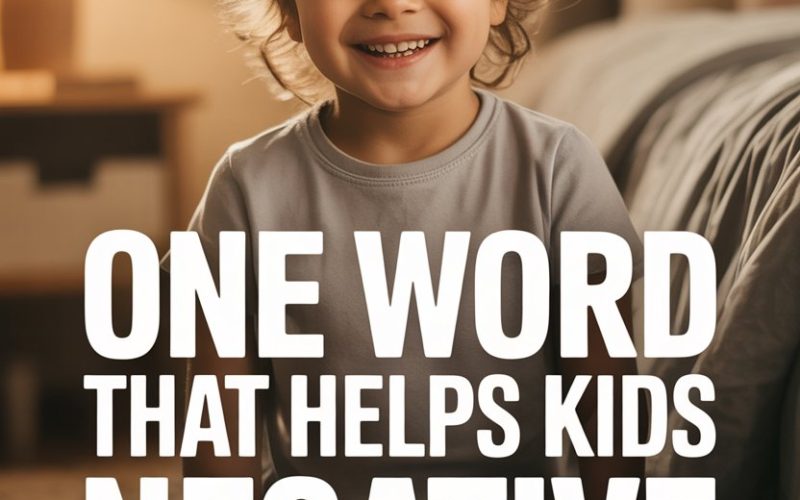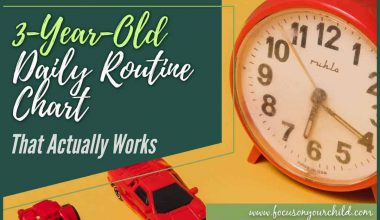Ever heard your child mutter, “I’m stupid,” or sigh, “I can’t do anything right”? You’re not alone.
Most parents have watched their kid’s self-confidence shrivel after one dodgy spelling test or a wonky art project.
Here’s a bit of hope: there’s a surprisingly simple, one-word trick that can help kids flip that gloomy script.
The Word That Changes Everything
The word? “Yet.”
Stick with me. The power in this little word is quietly enormous.
When your child mutters, “I can’t do this,” the statement feels final, negative, and a bit heartbreaking.
But slip in “yet” — as in, “I can’t do this yet” — and suddenly you’ve got a kid who’s open to possibility. Now it’s a journey, not a dead end.
This isn’t just feel-good fluff. Yet is grounded in decades of research on growth mindset (check out Stanford psychologist Carol Dweck’s work, if you want to geek out).
Kids who learn to add “yet” to their inner chatter are more likely to keep trying, learn from mistakes, and nudge their brains to grow.
Why Negative Self-Talk Shows Up
Kids aren’t born thinking they’re rubbish at things. Watch any toddler try to stack blocks or zip up a coat, and you’ll see wild optimism in action.
But somewhere between “look, I can fly!” and Year 3 maths, children begin to internalise criticism.
The world gets a little noisier with test scores, playground comparisons, offhand remarks, and — let’s be honest — the odd sulky grown-up comment.
Those “I’m not good enough” seeds can sprout with alarming speed.
Left unchecked, negative self-talk can embed itself deep. Kids start seeing “I messed up” not just as a moment, but as an identity.
What Makes ‘Yet’ So Magical
Before you dismiss this as motivational poster nonsense, let’s talk brain science.
When a child says, “I can’t do this,” their brain treats it as a closed door. Frustration, anxiety, and even avoidance are likely to follow.
Slip in “yet,” and you’re cracking that door open. The brain picks up on the possibility of improvement. Suddenly, effort feels worthwhile.
Kids don’t ignore mistakes or pretend everything’s easy — instead, they learn to see skills as something to build, not a fixed lottery ticket.
Research has shown that students who adopt this flexible thinking pattern are more resilient, take more academic risks, and even recover faster from setbacks.
How to Start Using ‘Yet’ at Home
Now for the nitty gritty. Tossing “yet” into conversation isn’t a silver bullet. (Sorry, it won’t make piano practice less painful overnight.)
But there are clever ways to help your child try this word on for size — and keep using it until it feels natural.
Give these approaches a go:
Model the Power of ‘Yet’ Yourself
If you can’t figure out the blasted remote or burn the dinner (again), narrate your inner dialogue: “I haven’t sorted this out yet. But I’m working on it.”
You’ll feel a bit silly at first. Kids, though, are experts at spotting hypocrisy; if they see you wrestling with frustration but staying open to learning, they’ll be more likely to do the same.
Reframe Their Statements
When your child says, “I can’t tie my laces,” gently add, “You can’t tie them yet, but look at how you’re getting closer.”
Note: This is not the moment for an inspirational TED Talk. Keep it light, keep it brief, and back away slowly if your kid is in full meltdown.
Praise the Process, Not the Person
Resist the urge to declare, “You’re a genius!” when your child finally cracks long division. Instead, try: “You worked so hard and didn’t give up — that’s why you got there.”
This nudge away from fixed traits (“I’m smart” or “I’m bad at maths”) to effort and progress is at the heart of the ‘yet’ mentality. It fosters grit, not just pride.
Make “Yet” a Family Word
Turn it into a household joke — the kind that is only mildly funny but somehow sticks. “I can’t find my keys… yet!” or “We haven’t got through a morning without someone losing a shoe… yet!”
You’re making it normal to be a work in progress.
Spotting Sneaky Negative Self-Talk
Not all kids blurt out their doubts. You might see it in subtle ways: procrastination, giving up quickly, or avoiding challenges altogether (“I’m just not a sporty person” rings any bells?).
Check for these signs:
- They shy away from new activities, even fun ones.
- They snap at gentle suggestions (especially from you).
- Their schoolwork suddenly drops off or becomes a battleground.
- They compare themselves to siblings or classmates, usually unfavourably.
If you catch a hint of this, don’t panic. Every kid dips into self-doubt. The trick is to spot it and nudge them back towards growth, not shame them for being human.
When ‘Yet’ Isn’t Enough
Sometimes, negative self-talk is more than a passing cloud. Persistent, harsh, or escalating self-criticism might signal something deeper — anxiety, perfectionism, or undiagnosed learning challenges.
If you hear phrases like “I’m useless” or “I hate myself” cropping up often, chat with your child’s teacher or doctor. You’re not alone, and a little extra support never hurts.
For most kids, though, “yet” can be a game changer. Especially when paired with patience and a bit of wit.
Teaching ‘Yet’ Without Sounding Like a Broken Record
We all know what happens when a phrase becomes a parental catchphrase (RIP, “because I said so”). To keep “yet” fresh, mix it up:
- Tell stories — your own or others’ — about struggles, flops, and eventual wins. The messier, the better.
- Spot “yet moments” in books or movies. Harry Potter couldn’t ride a broom well… yet. Elsa couldn’t control her powers… yet.
- Ask open-ended questions: “What might help you get there next time?” or “What would make this a bit easier?”
- Celebrate the small wins. Progress is rarely a straight line. Today it’s getting halfway up the climbing frame; tomorrow, maybe all the way.
Why It Works for Stressed-Out Parents Too
Here’s a little secret: many grown-ups could use a bit more “yet” in their own lives.
Ever muttered, “I’ll never get this house tidy,” or “I’m hopeless with tech”? Try tacking “yet” on the end and see what happens. Turns out, brains don’t stop learning at 30 (or 60).
Modelling self-compassion — even when you’re hiding in the loo for five minutes’ peace — is a lesson all its own.
Bonus: “Yet” pairs beautifully with a cup of tea and a biscuit. Allegedly.
“Yet” in Action — Real-Life Examples
Let’s imagine how this word plays out for different ages:
Early Years:
Little ones are dramatic — everything is “the worst day ever.” When a tower of blocks collapses, sit beside them and say, “You haven’t built that tall tower yet.
Want to try a different way?” Watch their shoulders drop and frustration turn into curiosity.
Primary Schoolers:
Multiplication tables causing tears? “You haven’t memorised them yet, but you’re practicing and getting better.” Back this up by pointing out progress, however tiny.
Teens:
This age group is allergic to anything that smells like patronising. Slip “yet” into conversation subtly. If your teen says, “I’ll never pass maths,” try, “It’s tough now, but you haven’t cracked it yet. What’s been tripping you up?” Offer help without pushing. Sometimes the best support is just being there, snacks in hand.
Cheat Sheet for Busy Parents
By now, you’re probably juggling snack requests and a lost school jumper while reading this.
Here’s the cheat sheet:
- Add “yet” to their negative statements (and your own).
- Praise effort and problem-solving, not just results.
- Share your own struggles and be honest about what you’re still learning.
- Make “yet” part of family banter.
- Watch for signs that your child needs extra support — and ask for help if needed.
When Small Words Make a Big Difference
The next time your child faces a challenge, listen for the finality in their voice and gently offer that tiny word: yet.
It’s not magic. But it’s pretty close.
And if you find yourself muttering, “I can’t get the kids to bed on time…” just tack on “yet.” You might be surprised how much lighter things feel.
Here’s to raising kids (and parents) who believe they can grow, stretch, and get there — even if “there” is just out of bed before noon on a Saturday.




